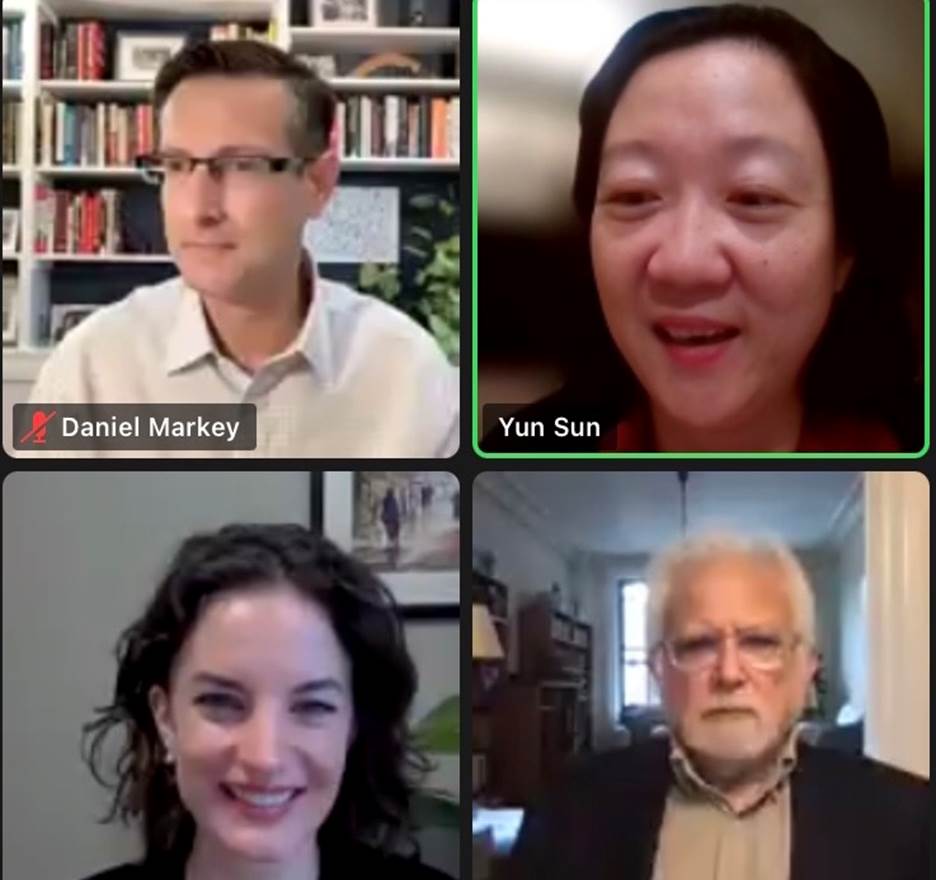
Experts Examine Role of Regional Stakeholders in Afghanistan
By Elaine Pasquini

Washington: The role of China, Iran, Pakistan, Russia and the United States in Afghanistan since the Taliban took control was discussed by a panel hosted by the Stimson Center on October 13.
Yun Sun, director of Stimson’s China program and co-director of its East Asia program, noted that although there are many Chinese businessmen in Kabul looking into financial opportunities, none have transpired into real projects on the ground. “China is not there yet,” she said, following her recent trip to the region. “There is concern about the sanctions and how those will affect Chinese companies or individuals that choose to work with the Taliban regime. I think China will go into Afghanistan, just not now.”
From the Taliban side there have been talks about reviving the delayed or suspended mega ventures in the country, including the copper mine project and the CNPC (China National Petroleum Corporation) oil drilling in the Amu Darya basin in northwestern Afghanistan. “There have been talks about their being resumed, but in reality, the actual operations have not really showed signs of resumption,” Sun said. “There are also discussions about China setting up a new industrial park in a suburb outside of Kabul.”
The Chinese, she continued, have been talking about including Afghanistan in its Belt and Road Initiative since 2015. “That is not new and this idea connecting Afghanistan and turning Afghanistan into another wing of CPAC (China-Pakistan Economic Corridor) has also been discussed for quite a while.”
During her recent trip to Pakistan, Elizabeth Threlkeld, director of Stimson’s South Asia program, repeatedly heard comments about unrealistic expectations that had not been met in terms of how Taliban policy had impacted Pakistan, a country “struggling how to calibrate its policy toward Afghanistan.”
On the question of recognition of the Taliban’s leadership of Afghanistan, she noted that Pakistan does not want to “go first on recognition. There is a sense of wanting to stick to the regional consensus calling for an inclusive government and highlighting the issue of girls’ education.”
Pakistanis she spoke to expressed frustration that “we’re not going to get anywhere [with the Taliban] if it’s not through engagement, working with them, predicting that a gradual process will play out.”
On her visit, Threlkeld also heard talk about the generational split within the Taliban. “Pakistan seems more optimistic that the younger generation that is coming up is going to be more willing to engage with the international community,” she said. “They have lived abroad and understand that things have changed since the last time that the Taliban was in power.”
While Pakistan is trying to shift the dial – as to how it thinks about the US as a partner – from the security domain towards health, education, and climate, “simultaneously you have these counter-availing pressures of terrorist threats emanating from Afghanistan and the TTP [Tehrik-e-Taliban Pakistan] proper that are pulling the relationship back to focus areas over the past 20 years,” she said.
“There is an ongoing political crisis in Pakistan with a great deal of uncertainty,” Threlkeld stated. “There is flooding and significant economic challenges with Pakistan having to go back to the IMF.”
Moderator Daniel Markey, a senior advisor on South Asia at the United States Institute of Peace, was surprised by the narrowness of the cooperation on counterterrorism that the United States and Pakistan presently have. “I would have thought that would have been the firmest foundation addressing specific threats going forward, but even there I think there is a lot of frustration,” he said.
Barnett Rubin, distinguished fellow at the Stimson Center, posited that “The Taliban are as firmly in control as any Afghan government for the past 40-45 years, although there are considerable sources of contestation and dissension within the Taliban government.”
Among the Afghans across the country, there is also disapproval of the Taliban regime with respect to their restrictions on girls’ education. “There are quite a few public demonstrations largely led by women which started in Kabul, but…have spread to other provinces,” he related. “And the longer the closure of high schools to girls goes on it seems the longer these things will go on.” Not only women are protesting – even the elders in some very conservative Pashtun provinces have supported these demonstrations and told the Taliban they needed to change that policy, he added.
Interestingly, Rubin pointed out, many Taliban officials support the idea of girls attending school. Deputy Foreign Minister Sher Mohammad Abbas Stanakzai has been very outspoken in favor of girls’ education. In a televised address on the International Day of Tourism, he sharply criticized the existing policy. “He could not have done that on television unless he had high level support,” Rubin asserted. In addition, the minister of defense – the son of Mullah Omar, and the minister of the interior – the son of Jalaluddin Haqqani, are both opposed to the current policy.
The National Resistance Front based in Tajikistan, the main external opposition to the Taliban, has only managed to maintain its hold on parts of Panjshir and neighboring provinces, but not beyond that area.
“It is quite a dynamic situation,” he said, “but there is no coherent alternative in place, so the Taliban are able to monopolize the relatively little bit of power they have.”
“The past 45 years have shown that any attempt to rule Afghanistan by a single small group will fail; it will generate opposition and create instability,” Rubin said. “If ethnic conflict between the Taliban and various communities starts weakening the state’s hold on the security institution, then the major beneficiary of it is the Islamic State and not any of the Afghan political entities.” And this is the overriding concern of the United States, the international community, and countries in the region.
(Elaine Pasquini is a freelance journalist. Her reports appear in the Washington Report on Middle East Affairs and Nuze.Ink.)

